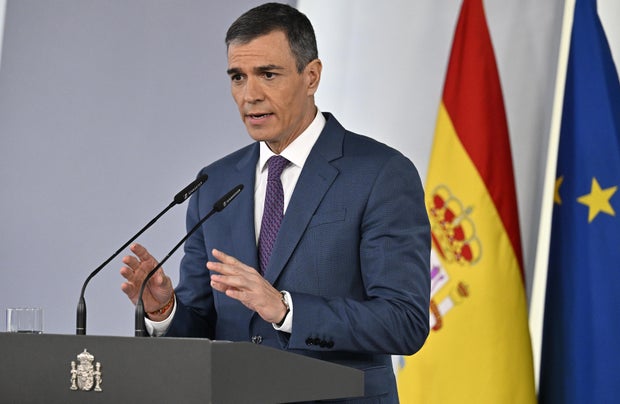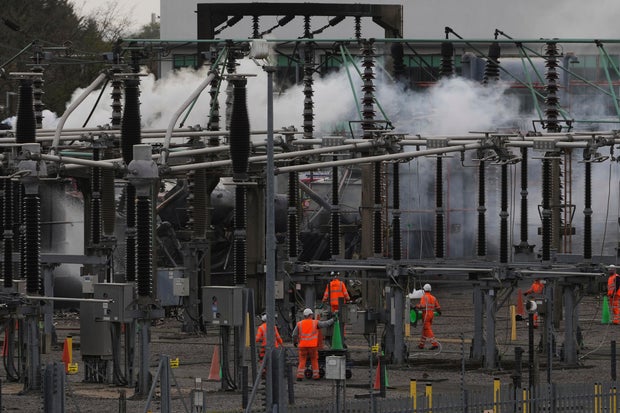Power outage in Spain and Portugal still a mystery, but leaders vow to solve it and prevent a recurrence

Spain’s government has set up a special commission to figure out what caused the massive power outage that hit virtually the entire country, Prime Minister Pedro Sánchez announced Tuesday, stressing that no potential causes had been ruled out. He also joined the wider European Union in vowing that everything necessary would be done to prevent a recurrence of the electricity grid failure, which ground most of the Iberian Peninsula — composed of Spain and neighboring Portugal — to a halt and left people in the dark until Tuesday morning.
“All the necessary measures will be taken to ensure that this does not happen again,” Sánchez said during a news conference in Madrid, just hours after the lights came back on.
Monday’s still-unexplained power outage was the most severe ever to hit Spain and Portugal, which have a combined population of around 60 million people. According to The Associated Press, Spain’s roughly 49 million inhabitants saw their country’s power generation drop by around 15 gigawatts — roughly 60% of the typical real-time demand in the nation — in the space of just five seconds, starting just after noon local time on Monday.
Spanish power distributor Red Eléctrica said early Tuesday that about 99% of its power capacity had been restored, after many residents of both Spain’s capital Madrid and Lisbon in neighboring Portugal went to sleep in total darkness.
Burak Akbulut/Anadolu via Getty Images
Offices across the Iberian Peninsula were closed and traffic was left in chaos on Monday. Airports, along with trains and subway systems, ground to a halt, ATMs ceased to function, and many mobile phone networks went down. Gas-powered generators and battery-powered radios flew off shelves.
What caused the power outage in Spain and Portugal?
Sánchez had said Monday that a problem in the wider European grid, which he called a “strong oscillation,” had been behind the outage, but that was never confirmed or expounded upon by the Spanish leader or the country’s electricity providers, and officials subsequently asked people to refrain from speculation, stressing that nothing had been ruled out. On Tuesday, Sánchez did rule out one possible issue, saying there had been no lack of nuclear power generation capacity on Monday. About 20% of Spain’s power comes from its nuclear plants.
Burak Akbulut/Anadolu via Getty Images
REN, Portugal’s national electricity grid operator, said Monday there had been a rare atmospheric phenomenon in Spain, which it pinned on extreme temperature variations, but that explanation was also never confirmed, and on Tuesday, Spain’s meteorological agency said it had not detected any “unusual meteorological or atmospheric phenomena” or unexpectedly dramatic temperature fluctuations the previous day.
Eduardo Prieto, who’s in charge of operations for Spain’s Red Eléctrica, said Monday that while the cause remained unclear, the power outage was unprecedented, “exceptional and extraordinary.”
The company had said Monday that there was no indication of a cyberattack causing the outage, but Sánchez said the following day that a separate investigation would continue looking at the possibility.
Antonio Costa, president of the EU’s European Council, said Tuesday that there were “no indications of any cyberattack.” His colleague Teresa Ribera, one of the executive vice presidents of the European Commission, also seemed to rule out sabotage, but she called the blackout “one of the most serious episodes recorded in Europe in recent times.”
The power outage was the second to hit Europe in just over a month. London’s Heathrow Airport, one of Europe’s busiest hubs, was shut down for most of March 20 after a local electricity substation went up in flames. The cause of that fire remains under investigation, but London’s Metropolitan Police said it did not appear suspicious.
AP Photo/Kirsty Wigglesworth
While no officials have suggested that either the fire in London or the blackout on the Iberian Peninsula were the result of nefarious activity, they both came amid heightened concern over Russian sabotage operations targeting Western European nations that support Ukraine.
A source familiar with the matter confirmed to CBS News in early November that U.S. and European law enforcement agencies were working together to investigate whether incendiary devices that detonated in July 2024 at DHL logistics hubs in Germany and Britain were part of a larger operation directed by Russian military intelligence agencies, senior officials in Russia’s government, or by outside individuals acting in Russia’s perceived interest.
There have also been numerous incidents of undersea cables, mostly carrying power or telecommunications data, being severed or disrupted in recent years, often after Russian or Chinese-linked vessels were in the area.
European officials have said such alleged sabotage actions are part of a Russian “hybrid war” against Ukraine’s backers and its democratic adversaries in the West.
Jovita Neliupšienė, the European Union’s ambassador to the United States, told CBS News’ “60 Minutes” in November that Russian sabotage, along with the assassination of political foes not only in Russia, but on European soil, was part of President Vladimir Putin’s bid to challenge “the order, the stability of Europe, and actually testing” the continent’s will and capacity to respond to such operations.
“All those sabotage, cyber, or attacks on critical infrastructure is actually happening on EU and NATO territory. They are testing how much they … can move.”







